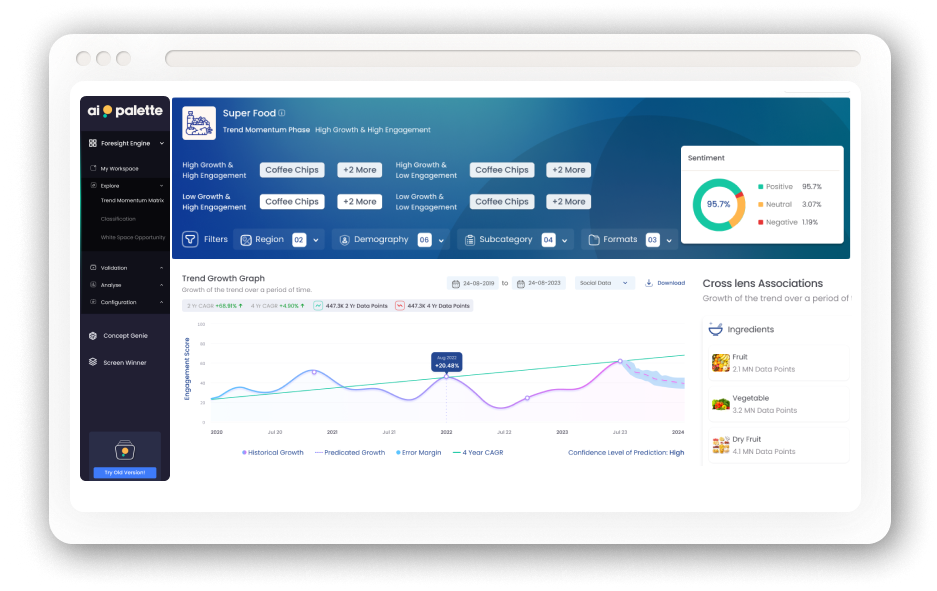It’s bananas!
As I stalked through articles on this year’s Expo West, a couple of products caught my attention – “banana milk” from two different brands. When I first saw them, I thought these were banana-flavored milk or smoothies of some sort and wondered why the heck these were remotely unique.
Upon closer inspection, I realized these were dairy-free, plant-based milk alternatives with the humble banana as the hero ingredient. That has taken a little getting used to. Isn’t that just… juice?
According to Ai Palette’s data, the following is a list of the most popular plant-based milk alternatives and flavors in the category.
Leading milk alternatives in the US
Top Bases | Data Points | 2-yr CAGR | Stage |
Almond Milk | 1,788,384 | -11.55% | Mature |
Oat Milk | 1,752,895 | -3.22% | Mature |
Coconut Milk | 1,615,927 | 15.97% | Mature |
Soy Milk | 216,124 | -14.48% | Mature |
Cashew Milk | 117,886 | -7.32% | Declining |
Macadamia Milk | 18,556 | -59.15% | Declining |
Flax Milk | 10,255 | -65.36% | Declining |
Source: Ai Palette Foresight Engine (As of March 2023)
Leading flavors in milk alternatives in the US
Top Flavors | Data Points | 2-yr CAGR | Stage |
Peanut Butter | 2,488,296 | 25.65% | Mature |
Chocolate | 425,489 | 914.16% | Mature |
Coffee | 168,747 | 1679.98% | Mature |
Vanilla | 164,103 | 787.54% | Mature |
Banana | 146,824 | 1389.86% | Mature |
Source: Ai Palette Foresight Engine (As of March 2023)
While banana is a popular enough flavor and ingredient within the category, it turns out that banana milk is unusual but not exactly new. There are a few recipes for the same by home chefs and even a few such retail products knocking about.
The products featured at Expo West included Mooala’s plant-based, dairy-free, and nut-free banana milk range, which has been around for a while, but now comes in a new single-serve pack size. The banana milk is made with water, organic banana puree, organic roasted sunflower seeds, as well as a couple of other organic ingredients depending on the flavor. The sunflower seeds are said to give the banana milk a creamy texture.
Unlike many of the plant-based milks in the market today, Mooala does not highlight protein. In fact, it just has 1g of protein per serving. Instead, the brand promotes its banana milk range as being a good source of calcium and potassium.
The other product is a brand new one called Kunana banana milk. This product is said to be made from upcycled bananas from Ecuador to which is added a proprietary chickpea protein made by InnovoPro. The brand calls out its protein credentials on the front of the pack highlighting that each serving offers 5g of protein. The low-sugar, dairy-free milk is also said to be a good source of natural calcium, fiber, potassium, and vitamin B12.
Kunana upcycles misshapen or imperfect bananas for this dairy alternative, which helps promote sustainability and waste reduction.
It’s interesting that Kunana says that the milk alternative does not have a very strong banana taste, while on the other hand, Mooala says that its original flavor tastes like banana bread.
While these are fascinating products and maybe even somewhat popular in the banana milk trends – Mooala has been in business for a while now – I am still unsure of the utility of banana milk. I wouldn’t want my coffee or tea to have any hint of banana, and neither would many other consumers, I suspect. I also fail to see how this isn’t just a watered-down smoothie or protein shake.
I’m not usually a stickler for labels and nomenclature. That which we call a rose, by any other word, and so forth. The US FDA in February 2023 came out with regulations saying that it’s perfectly fine for soy, oat, almond, and other drinks that refer to themselves as “milk” can keep using the name as long as the manufacturers add the ingredient qualified in front of “milk”, much to the chagrin of dairy producers. For the most part, I concur.
On the other hand, the EU appears to be convinced that consumers will be confused by nomenclatures like nut milk or vegan yogurt. The region’s leading court said as far back as 2017 that dairy alternatives sold in the EU cannot use words like “milk” or “butter”, which are strictly reserved for animal products. Nanny state much?
But with “banana milk”, I’m going to side with the EU.
At the same time, I can’t deny I’m curious about which fruit will be the next “milk” base…






















